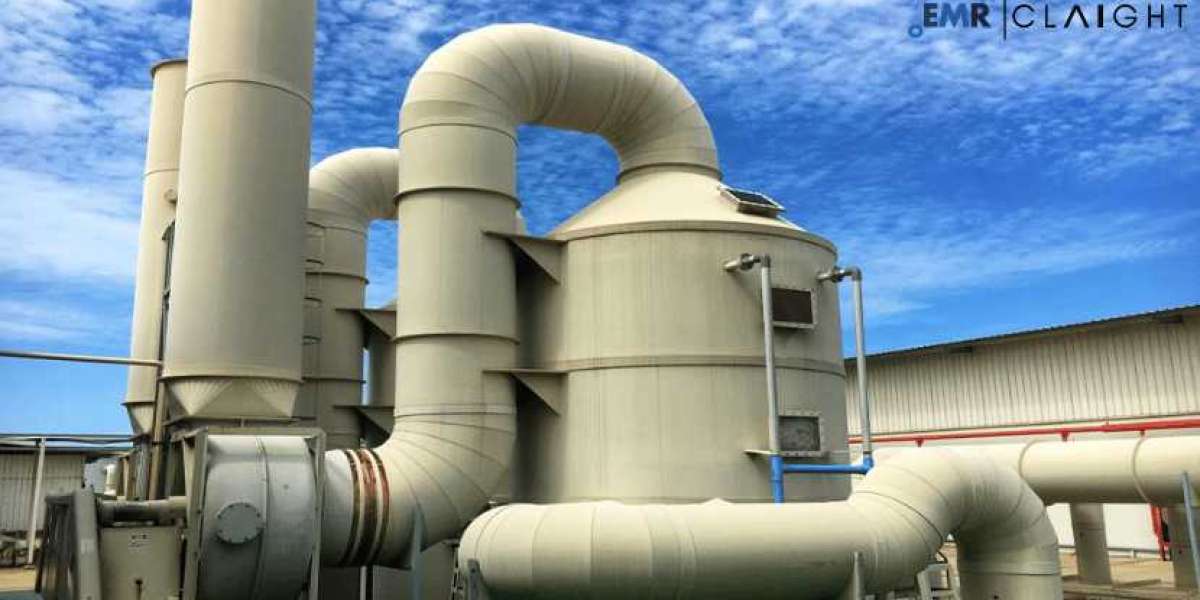Air Quality Control Systems Market Outlook
The size of the global air quality control systems market in 2023 was estimated to be USD 1,15,108.44 million. The market is projected to reach USD 1,78,570.96 million by 2032, growing at a CAGR of 5% in the forecast period of 2024-2032. This market expansion is being driven by several factors, including increasing regulatory frameworks aimed at reducing air pollution and rising public awareness of environmental health hazards. Additionally, industrialization and urbanization are intensifying the demand for effective air quality control systems, further contributing to the market's growth. These systems are increasingly being adopted across various sectors, such as power generation, manufacturing, and oil and gas, where emissions control is a critical concern. As governments and industries continue to adopt stringent environmental policies, the market for air quality control systems is expected to witness robust demand, leading to sustained growth in the coming years.
Air Quality Control Systems Market Share
The Air Quality Control Systems Market has experienced notable growth in terms of both size and share, driven by evolving environmental regulations and industry trends. With the growing global emphasis on reducing harmful emissions, air quality control systems have become essential for industries looking to comply with regulations and improve air quality. The rising adoption of technologies such as flue gas desulfurization, selective catalytic reduction, and electrostatic precipitators has contributed significantly to the market's upward trajectory.
Get a Free Sample Report with Table of Contents@ https://www.expertmarketresearch.com/reports/air-quality-control-systems-market/requestsample
In the competitive landscape, major players are leveraging strategies such as product innovation, strategic partnerships, and geographic expansion to gain a competitive edge. Companies are investing heavily in research and development to enhance the performance and efficiency of air quality control systems, further boosting market growth. As the demand for clean air solutions increases globally, the market for air quality control systems is expected to continue its upward trend.
Air Quality Control Systems Market Segmentation
Air quality control systems encompass a wide range of technologies and solutions designed to monitor, regulate, and improve air quality across various industries. These systems are segmented based on type, application, and end-use industry.
By Type:
- Flue Gas Desulfurization (FGD): Used for removing sulfur dioxide from exhaust flue gases in power plants and industrial facilities.
- Selective Catalytic Reduction (SCR): A technology used to reduce nitrogen oxide emissions in industries such as power generation and cement.
- Electrostatic Precipitators (ESP): A filtration device used to remove fine particulate matter from gas streams.
- Fabric Filters: Used to capture particulate matter in industries such as cement, steel, and mining.
- Others: Other technologies such as scrubbers and thermal oxidizers are also part of this market segment.
By Application:
- Power Generation: The largest application segment, driven by stringent regulations to control emissions from coal-fired power plants.
- Cement Manufacturing: Increasingly adopting air quality control systems to reduce emissions during production processes.
- Oil Gas: The need to control emissions from refineries and petrochemical plants is fueling demand in this segment.
- Chemical Petrochemical: Air quality control systems are crucial for maintaining environmental standards in chemical manufacturing.
By End-Use Industry:
- Industrial: Includes manufacturing facilities, refineries, and other industrial sectors where emissions control is a priority.
- Commercial: Air quality control systems are increasingly being used in commercial buildings to ensure a healthy indoor environment.
- Residential: With rising concerns over indoor air quality, these systems are gaining traction in residential applications as well.
The Air Quality Control Systems Market is further segmented geographically into North America, Europe, the Asia Pacific, Latin America, and the Middle East and Africa, reflecting its global presence and addressing regional demands for air quality solutions.
Air Quality Control Systems Market Growth Analysis
The Air Quality Control Systems Market is in a robust growth phase, driven by several key factors. Increasing regulatory pressure to reduce industrial emissions and combat air pollution is a major driver of this market. Governments worldwide are implementing stricter environmental regulations, particularly in industries such as power generation, cement manufacturing, and oil and gas, where emissions are significant contributors to air pollution.
Furthermore, the rising public awareness of the harmful effects of air pollution on human health and the environment is leading to increased demand for air quality control solutions. Industrial facilities are adopting these systems to reduce their environmental impact and comply with regulatory standards, driving the market's growth.
In addition to regulatory pressures, technological advancements in air quality control systems are enhancing their efficiency and effectiveness. Innovations such as the integration of artificial intelligence (AI) and the Internet of Things (IoT) into these systems are enabling real-time monitoring and control of emissions, further driving market growth.
The Air Quality Control Systems Market is also benefiting from the increasing investments in infrastructure development, particularly in emerging economies. As industrialization and urbanization continue to rise, the demand for air quality control systems is expected to grow, creating new opportunities for market players.
Air Quality Control Systems Market Trends and Opportunities
The Air Quality Control Systems Market is experiencing several key trends and opportunities that are shaping its future growth. One of the most prominent trends is the increasing adoption of smart air quality control systems. These systems utilize advanced technologies such as AI and IoT to provide real-time monitoring and predictive maintenance, improving overall system efficiency and reducing operational costs.
Another trend is the growing demand for sustainable and energy-efficient air quality control solutions. As industries seek to reduce their carbon footprint, there is an increasing focus on developing air quality control systems that are both environmentally friendly and cost-effective. This trend is particularly evident in the power generation sector, where companies are investing in technologies such as flue gas desulfurization and selective catalytic reduction to reduce emissions.
The Asia Pacific region presents significant opportunities for market growth, driven by rapid industrialization and urbanization. Countries such as China and India are investing heavily in air quality control systems to combat rising pollution levels and meet international environmental standards. The increasing awareness of air pollution's impact on public health in these regions is also driving demand for air quality control solutions.
Moreover, the expansion of renewable energy projects, such as wind and solar power, is creating new opportunities for air quality control system providers. As industries transition to cleaner energy sources, there will be a growing need for air quality control solutions to manage emissions from these new energy systems.
Competitive Landscape
The Air Quality Control Systems Market is highly competitive, with several key players actively working to strengthen their market positions through innovation, strategic partnerships, and geographic expansion. Some of the leading companies in the market include:
- Mitsubishi Hitachi Power Systems: A major player in the air quality control systems market, known for its advanced flue gas desulfurization and selective catalytic reduction technologies.
- General Electric: Provides a wide range of air quality control systems, including fabric filters and electrostatic precipitators, serving industries such as power generation and cement manufacturing.
- Siemens AG: Offers integrated air quality control solutions that combine emissions monitoring with advanced filtration technologies.
- Thermax Ltd.: A key player in the market, specializing in air quality control systems for industries such as oil and gas, power generation, and chemicals.
- Honeywell International Inc.: Known for its innovative air quality control systems that incorporate AI and IoT for real-time monitoring and control.
These companies are focusing on expanding their product portfolios and exploring new market opportunities through mergers and acquisitions. Additionally, investments in research and development are enabling market players to enhance their product offerings and stay competitive in the evolving air quality control systems market.
Read More Reports:
https://www.expertmarketresearch.com/articles/top-epc-companies
https://www.expertmarketresearch.com/reports/frac-sand-market
https://www.expertmarketresearch.com/reports/us-financial-services-market
Media Contact:
Company Name: Claight Corporation
Contact Person: Eren smith, Corporate Sales Specialist – U.S.A.
Email: [email protected]
Toll Free Number: +1-415-325-5166 | +44-702-402-5790
Address: 30 North Gould Street, Sheridan, WY 82801, USA
Website: https://www.expertmarketresearch.com
Aus. Site: https://www.expertmarketresearch.com.au



